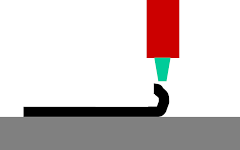8.4.1 Typical application errors
Typical application errors
- Drag errors
- Dosing too late, dosing too early
- Initial blobs
- Overhanging strands of adhesive at the end of the dosing
- Hollow beads
- “Wavy” beads
Drag errors
The application of the adhesive does not follow the pre-programmed path
Dependent on:
- Speed of travel
- The radians to be travelled
- Distance of the dosing nozzle to the component
- Adhesive (wetting, viscosity)
- Surface state of the substrates
Remedy:
- Fine adjustment (programming)

Dosing too late, dosing too early:
Start of the bead application dependent on:
- The viscosity
- The pre-pressure
- The distance of the dosing nozzle to the component
The control must “wait” until the start of the bead reaches the component.
Likewise, the dosing procedure must be stopped before reaching the end point.
Initial blobs
Cause: Pressure drop at the start of dosing

At the end of the dosing process the outlet valve closes and the feed pump stops. There then follows pressure equalisation along the length of the line. The moment the outlet valve is opened again, the adhesive there is under a higher pressure than during the rest of the application process, causing initially “too much” adhesive to be applied. The effect is in some cases intensified by delayed start of the robot.
The effect is also intensified by air in the system (inadequate de-aeration on changing the container) or hoses/lines having inadequate dimensional stability.
Remedy:
- Minimise the length of line between the pump and outlet
- Start of dosing during movement
Overhanging strands of adhesive at the end of the dosing:
Remedy: Snuff-back valve:
The closing action creates a slight vacuum in the outlet needle
→ The adhesive is drawn back into the dosing nozzle
→ Cleaner cut-off

Hollow adhesive beads
Cause: Entrapped air at too high application rates; especially for high viscosity adhesives
Remedy: Lower the application rate

“Wavy” beads

Cause:
- Too large a distance from the dosing nozzle to the substrate
- Possibly a contaminated dosing nozzle
Remedy:
- Reduce the distance (reprogram the path)
- Inspect dosing nozzles regularly and change if necessary



